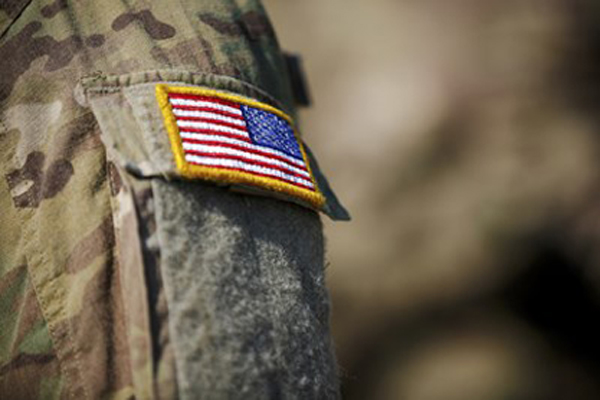
WASHINGTON (BP) — The Trump administration will bar transgender individuals from enlisting in the U.S. military and let Defense Secretary James Mattis decide whether those already in the military may continue to serve, according a Wall Street Journal report confirmed by other media outlets.
The White House explained its policy in a two-and-a-half-page memo to the Pentagon, The Journal reported Wednesday (Aug. 23), fleshing out specific policy implications of President Trump’s July 26 Twitter announcement that “the United States government will not accept or allow transgender individuals to serve in any capacity in the U.S. military.”
Southern Baptists with military and Defense Department experience underscored the biblical concept of gender and urged prayer for civilian and military leaders of the U.S. Armed Forces.
Daniel Heimbach, a Southeastern Baptist Theological Seminary professor and former deputy assistant secretary of the Navy for manpower, told Baptist Press “the new White House guidelines allowing military leaders to remove people claiming transgender sexual identity and to prevent them from enlisting are wise and responsible.”
Former U.S. Army chief of chaplains Douglas Carver asked believers to pray for Trump and Mattis as well as “senior military and civilian Department of Defense leadership.”
Their decisions about transgender military service, Carver told BP in written comments, “will impact the combat readiness, health and safety, unit cohesion and morale of our military that remains engaged in the longest war in U.S. history, including our over 200,000 troops presently deployed in 177 nations. We must pray that this policy avoids the disruption of military commanders’ strategic focus, leader and unit development and the intensive training cycle required for deployment to a combat environment.”
The White House memo also instructs the military to stop spending money on so-called gender transitions for military personnel and gives Mattis six months to implement the new policy, according to The Journal.
Under the administration’s policy, Mattis — a retired Marine Corps general — will decide whether a transgender service member must exit the military based on “deployability,” defined by The Journal as “the ability to serve in a war zone, participate in exercises or live for months on a ship.”
Trump’s policy reverses a 2016 decision by then-President Obama to lift a ban on transgender service members.
Heimbach, senior professor of Christian ethics at Southeastern, said the Trump administration’s guidelines “address a point of fundamental incompatibility between the selfless sacrificial ethic on which military service and national security depend and the spreading popularity of self-centered identity valuing based on self-proclaimed sexual feelings.”
“There is no externally fixed basis for” claiming a gender identity different than one’s biological sex, Heimbach said in written comments. “It is entirely internal, subjective and beyond assessing by anyone other than the one demanding everyone else accept and adjust to whatever is claimed. The problem recognized by the White House and Pentagon leadership is that military service requires members to adopt a sacrificial ethic that subordinates self-interest and disciplines feelings to the point of risking health and sometimes life itself.”
There is “no middle ground” between accepting transgender troops and banning them, he said. “The services can train and maintain battle ready troops or they can accommodate self-centered identity valuing. But they cannot do both. Thus the new guidelines truly are wise and responsible, and anything less would be foolish and terribly irresponsible.”
Advocates of transgender military service decried the Trump administration’s policy.
Sue Fulton, former president of Sparta, an organization that advocates open military service by transgender individuals, said “there’s no difference between the deployability of transgender service members” and others. Troops undergoing a gender transition, she told The Journal, can undergo surgical procedures “when they are at home base” and subsequently deploy without any “ongoing treatments.”
Carver, the North American Mission Board’s executive director of chaplaincy, said “regardless” of the Trump administration’s policy decisions, “endorsed Southern Baptist Chaplains will continue to treat every soldier, sailor, airman, marine and coast guardsman with Christ-centered love, dignity, honor and respect.”
In the next several weeks, Carver added, NAMB “will issue specific policy guidance to all endorsed [Southern Baptist Convention] chaplains regarding ministry to the men and women under their pastoral care struggling with their sexual orientation and gender identification issues.”
If the military ever allows transgender troops to enlist and serve openly, Carver said, Southern Baptist and other military chaplains “may slowly lose their religious liberty to preach or counsel biblical truth regarding the God-ordained connection between one’s biological sex and their gender-specific orientation. Even if Southern Baptist chaplains are allowed to freely exercise their religious liberty, our chaplains might be forced or feel pressured to silently condone the transgender lifestyle.”
Estimates of the total number of transgender troops in the U.S. military range from just over 1,000 to more than 10,000. In all, there are more than 2 million reserve and active duty troops.
A 2014 Southern Baptist Convention resolution “on transgender identity” affirmed “God’s good design that gender identity is determined by biological sex and not by one’s self-perception.” The resolution also invited “all transgender persons to trust in Christ and to experience renewal in the Gospel.”






















